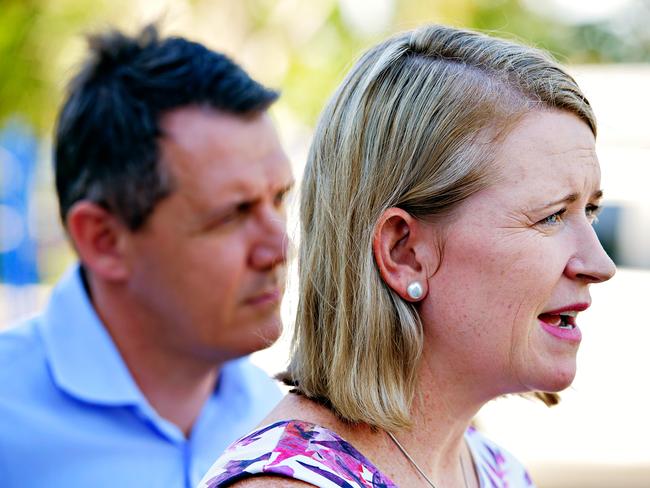NT Government to set limit on debt
THE TERRITORY Government is expected to install a “debt ceiling” as it tries to dig itself out of its fiscal crisis

News
Don't miss out on the headlines from News. Followed categories will be added to My News.
THE TERRITORY Government is expected to install a “debt ceiling” on its borrowings as it tries to dig itself out of its fiscal crisis.
Chief Minister Michael Gunner and Treasurer Nicole Manison will today release John Langoulant’s full report into the NT’s fiscal position as well as their Labor Government’s response to it.
The NT News understands the report makes 76 recommendations to government, most of which will be accepted.
One recommendation which is expected to be accepted is the creation of a “debt ceiling” which will set a limit on the amount the NT Government may borrow.
The interim Langoulant report, released in December, showed the NT was on track to hit $35 billion in debt by 2030 if expenditure growth continued at its current level. It showed the NT was borrowing $4 million a day to cover its basic operational costs, including interest repayments and the salaries of public servants.
BUDGET REPAIR STORIES
PLAN to save more than $1.4B over ten years
MORE than 50 of the highest public servents face the sack
POLLIES, chief executives cop pay freeze amongst budget crisis
SHORTEN government would ‘bail out’ cash-strapped NT
The NT News yesterday revealed the Gunner Government would install a freeze on the salaries of politicians and the salaries of the 643 public servants on executive contracts.
That measure is expected to save $25 million in three years.
About 3 per cent of the NT’s public servants are “executives”, earning between $217,533 and $391,533 a year. By contrast, 2 per cent of Victorian public servants are executives, and only 1 per cent in NSW.
The “basic salary” of a Territory MLA is $162,696, with the chief minister taking home double that.
That doesn’t include allowances, including generous “travelling allowances” of between $291 and $457 a night, dependent on location. Members from outside Darwin receive $400 a night to stay in the capital on parliamentary business. That is far in excess of the $288 a night allowance paid to federal politicians to stay in Canberra.
Mr Gunner shrugged off questions as to whether politicians should take a pay cut or reduce their allowances, saying the $25 million saving was a “significant contribution”.
Community and Public Sector Union NT secretary Kay Densley said it was small change.
“Parliamentarians and executive having a pay freeze when they earn a couple of hundred grand a year is different to someone on $60,000 or so a year trying to deal with rising cost of living and raising a family,” she said.
Most public servants have wage increases locked in until 2021, after the next election.
Mr Langoulant was engaged by the WA government to undertake a similar review there in 2017. His recommendation to cap public service wage increases at $1000 a year was accepted by WA.
IN OTHER NEWS
Ms Densley said she feared similar measures might be put in place in the NT when current agreements expire.
“We would hate to see NT workers being held to ransom to accept bad offers when we need people to be afford to live and stay in the Territory,” she said.
Ms Densley said the Gunner Government’s “stupid staffing cap” under which the public service must remain at 2018 levels, had led to positions for frontline positions such as child protection officers remaining vacant for long stretches.
Opposition Leader Gary Higgins backed the move to freeze pollies’ wages, but said the government could save a further $2 million a year by pruning its Cabinet back from nine ministers to eight.


